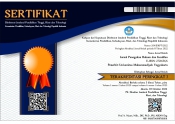Legal Considerations Judex Factie Acquittal and Guilty Judgments by Judex Juris
DOI:
https://doi.org/10.18196/jphk.v5i1.18145Keywords:
Corruption, Judex factie, Judex jurisAbstract
The corruption case involving the former North Konawe regent, Aswad Sulaiman, was acquitted by the Kendari Corruption Court in 2017, according to decision Number 56/Pid.Sus-TPK/2016/PN.Kdi. While the Supreme Court Cassation decision number 1964 K/PID.SUS/2017 decided that Defendant Aswad Sulaiman was proven legally and convincingly guilty of committing a crime by jointly committing an ongoing criminal act of corruption, imposing a prison sentence of 6 years and an IDR 200 million fine. If not paid, it will be replaced with imprisonment for 6 months, punished for producing a compensation of IDR 3,310,639,545 (three billion three hundred ten million six hundred thirty-nine thousand five hundred and forty-five rupiah). This study focuses on the legal ratio of the panel of judges in imposing an acquittal in the corruption case Number 56/Pid.Sus-TPK/2016/PN.Kdi and decision number 1964 K/PID.SUS/2017. This study used normative legal research with a statutory approach and a case approach, Law Number 31 of 1999 concerning the Eradication of Criminal Acts of Corruption, which was last amended by Law Number 20 of 2001. The results are that the recovery of state financial losses must be investigated as the starting point that the defendant has committed corruption by not releasing him from criminal responsibility but only as a basis for mitigating considerations for the defendant. The judges deciding this case have at least gone through 3 stages: constating, qualifying, and constituting.References
Abdullah, N., & Chalim, M. A. (2017). Kedudukan dan Kewenangan Notaris dalam Membuat Akta Otentik. Jurnal Akta, 4(4).
Agustin, L. A., & Astuti, P. (2022). Analisis Yuridis Perkara Jaksa Pinangki (Studi Kasus: Putisan No. 10/Pid.Sus-Tpk/2021/PT DKI. Novum: Jurnal Hukum, In Press(Syarat SPK (10)).
Amiruddin, & Asikin, Z. (2012). Pengantar Metode Penelitian Hukum. Jakarta: Raja Grafindo Persada.
Ariyanti, V. (2019). Kebebasan Hakim dan Kepastian Hukum dalam Menangani Perkara Pidana di Indonesia. Mahkamah: Jurnal Kajian Hukum Islam, 4(2).
Budiastuti, S. R. (2019). Implikasi Konsep Utilitarianisme dalam Penegakan Hukum Tindak Pidana Narkotika: Kajian Putusan Pengadilan Negeri Yogyakarta Nomor 389/Pid.Sus/2015/PN.Yyk. Jurnal Wacana Hukum, 25(2), 16. https://doi.org/10.33061/1.jwh.2019.25.2.3003
Drani, F. N. (2020). Penyelesaian Korupsi dengan menggunakan Restoratif Justice. Jurnal Penelitian Hukum De Jure, 20(4), 605. https://doi.org/10.30641/dejure.2020.V20.605-617
Gunawan, J. A. H. E., Mas, M., & Madiong, B. (2023). Analisis Putusan Pengadilan Negeri Mamuju Nomor: 01/Pid.Sus-Tpk/2019 Kaitannya Dengan Pengembalian Kerugian Negara Dalam Tindak Pidana Korupsi. Indonesian Journal of Legality of Law, 5(2), 417–428. https://doi.org/10.35965/ijlf.v5i2.2618
Handoko, R. (2018). Tinjauan Yuridis Kasasi Terhadap Putusan Bebas Dalam Sistem Pemidanaan Di Indonesia. Spektrum Hukum, 15(2), 208. https://doi.org/10.35973/sh.v15i2.1118
Hariyanto, D. R. S., & Pradnya Yustiawan, D. G. (2020). Paradigma Keadilan Restoratif Dalam Putusan Hakim. Kertha Patrika, 42(2). https://doi.org/10.24843/KP.2020.v42.i02.p06
Haykal, M. R. (2018). Analisi Yuridis Penerapan Unsur Melawan Hukum Materiil dalam Putusan Mahkamah Agung atas Extraordinary Crime pada Tindak Pidana Korupsi Pasca Putusan Mahkamah Konstitusi Nomor: 003/PPU-IV/2003. Majalah Ilmuah Warta Dharmawangsa, (55).
Isnantiana, N. I. (2017). Legal Reasoning Hakim dalam Pengambilan Putusan Perkara di Pengadilan. ISLAMADINA, 18(2), 41. https://doi.org/10.30595/islamadina.v18i2.1920
Juanda, E. (2017). Penalaran Hukum (Legal Reasoning). Jurnal Ilmiah Galuh Justisi, 5(1), 157. https://doi.org/10.25157/jigj.v5i1.316
Lubis, M. A., Dhevi, R. S., & Yasid, M. (2020). Penegakan Hukum Terhadap Aparat Sipil Negara Yang Melakukan Pelanggaran Hukum Dalam Mewujudkan Good Governance. Jurnal Darma Agung, 28(2). https://doi.org/10.46930/ojsuda.v28i2.649
Marzuki, P. M. (2010). Penelitian Hukum. Jakarta: Kencana Prenada.
Nizar, M., Amiruddin, & Sabardi, L. (2019). Ajaran Kausalitas dalam Penegakan Hukum Pidana (Studi Putusan Mahkamah Agung Nomor 498 K/PID/2016). Jurnal Education and Development, 7(1).
Putra, N. R., & Linda, R. (2022). Impact of Social Change on Society From the Crime of Corruption. Integritas: Jurnal Antikorupsi, 8(1), 13–24. https://doi.org/10.32697/integritas.v8i1.898
Rinaldi, F. (2022). Proses Bekerjanya Sistem Peradilan Pidana Dalam Memberikan Kepastian Hukum Dan Keadilan. Jurnal Hukum Pespublica, 21(2).
Rini, N. S. (2018). Penyalahgunaan Kewenangan Administrasi Dalam Undang Undang Tindak Pidana Korupsi. Jurnal Penelitian Hukum De Jure, 18(2), 257. https://doi.org/10.30641/dejure.2018.V18.257-274
Suwito, S. (2017). Putusan Pengadilan Tindak Pidana Korupsi yang Menerobos Ketentuan Pidana Minimum Khusus sebagai Bentuk Penemuan Hukum oleh Hakim. Khairun Law Journal, 1(1), 48–61.
Wijaya, W. (2020). Kewenangan Diskresi Mengenai Peluang Sikap Tindak Administrasi Negara Dalam Perberdayaan Hukum Progresif. Masalah-Masalah Hukum, 49(2), 148–159. https://doi.org/10.14710/mmh.49.2.2020.148-159
Downloads
Published
Issue
Section
License
Copyright statementAuthors who publish with JURNAL PENEGAKAN HUKUM DAN KEADILAN agree to the following terms:
- Authors retain copyright and grant the journal right of first publication with the work simultaneously licensed under a Creative Commons Attribution License that allows others to share the work with an acknowledgement of the work's authorship and initial publication in this journal.
- Authors are able to enter into separate, additional contractual arrangements for the non-exclusive distribution of the journal's published version of the work (e.g., post it to an institutional repository or publish it in a book), with an acknowledgement of its initial publication in this journal.
- Authors are permitted and encouraged to post their work online (e.g., in institutional repositories or on their website) prior to and during the submission process, as it can lead to productive exchanges, as well as earlier and greater citation of published work (See The Effect of Open Access).
- Share — copy and redistribute the material in any medium or format
- Adapt — remix, transform, and build upon the material
- Attribution — You must give appropriate credit, provide a link to the license, and indicate if changes were made. You may do so in any reasonable manner, but not in any way that suggests the licensor endorses you or your use.
- NonCommercial — You may not use the material for commercial purposes.
- ShareAlike — If you remix, transform, or build upon the material, you must distribute your contributions under the same license as the original.
- No additional restrictions — You may not apply legal terms or technological measures that legally restrict others from doing anything the license permits.

JPHK is licensed under a Creative Commons Attribution-NonCommercial-ShareAlike 4.0 International License.

